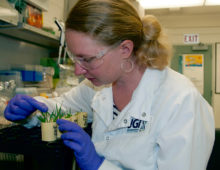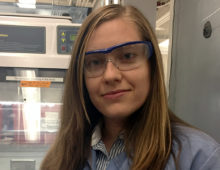The Laurentian Great Lakes hold 20 percent of Earth’s surface freshwater and provide inestimable ecosystem services, yet surprisingly little is known about the structure and activity of microbial communities in this ecosystem. This project seeks to characterize the metabolic diversity and activity of microbes across the Great Lakes, and to understand how these microbes control…
Gene Expression in Phlebiopsis gigantea
This project seeks to exploit the unique ability of the fungus Phlebiopsis gigantea to rapidly colonize freshly cut loblolly pine. Investigations will advance understanding of the early and exclusive deconstruction of coniferous wood by P. gigantea, provide a framework for functional analyses of hitherto unknown proteins, develop effective biocontrol strategies against economically important root rot…
Genus-Wide Genomics of Trichoderma
Trichoderma is a genus of fungi that has a broad impact on mankind. There are approximately 270 species of Trichoderma fungi that have varied interactions with other fungi, animals, plants, and efficiently degrade plant biomass material. One species in particular (T. reesei) is well-established for production of enzymes used in the biofuel and biorefinery industries….
A High Quality Genome for Agave tequilana
Agave tequilana uses crassulacean acid metabolism (CAM) as a photosynthetic adaptation to water-limited environments, with great potential for sustainable production of biofuels due to high water-use efficiency (WUE), high biomass yield, low lignin content, and high cellulose and sugar contents. The goal of this research is to generate high-quality genome assembly and gene annotation for…
Daily Cycles of Microbial Decomposition
Marine and freshwater microbial communities and activities vary over the course of the day. In contrast, researchers know little about whether these same patterns exist on land. The team aims to profile the activity of surface soil microbes (those on dead leaf litter) of an arid ecosystem over the course of three days. The leaf…
Microbes That Impact the Soil Carbon Cycle
This project will identify and characterize the dominant uncultivated microorganisms that mediate major transformations in the soil carbon cycle. The genetic capacity of microbial communities can be studied through genomic approaches but it remains difficult to make direct links between the genetic capacity of microorganisms and their function in the soil carbon cycle. Proposer: Dan…
River Microbes and the Carbon Cycle
River microbes play a key role in transforming and metabolizing dissolved organic matter (DOM) and thus have an important impact on global carbon cycles. However, scientists’ understanding of the relationship between the chemical composition of DOM and the genomic functional activity of microbial communities remains limited. Here, researchers aim to produce an extensive metagenomic and…
Meet a JGI Postdoc: Estelle Schaefer
From September 18-22, 2017, we introduce you to 5 postdocs at the JGI in honor of National Postdoc Appreciation Week, which recognizes the contributions of these early career researchers. Through a series of hard-hitting questions, we find out what drives each one. What do you work on? Plant and microbe interactions. I’m setting up…
Meet a JGI Postdoc: Adam Session
From September 18-22, 2017, we introduce you to 5 postdocs at the JGI in honor of National Postdoc Appreciation Week, which recognizes the contributions of these early career researchers. Through a series of hard-hitting questions, we find out what drives each one. What do you work on? I work in the Eukaryote Super Program…
Meet a JGI Postdoc: Kateryna Zhalnina
From September 18-22, 2017, we introduce you to 5 postdocs at the JGI in honor of National Postdoc Appreciation Week, which recognizes the contributions of these early career researchers. Through a series of hard-hitting questions, we find out what drives each one. What do you work on? I study how plants use their exudation…


